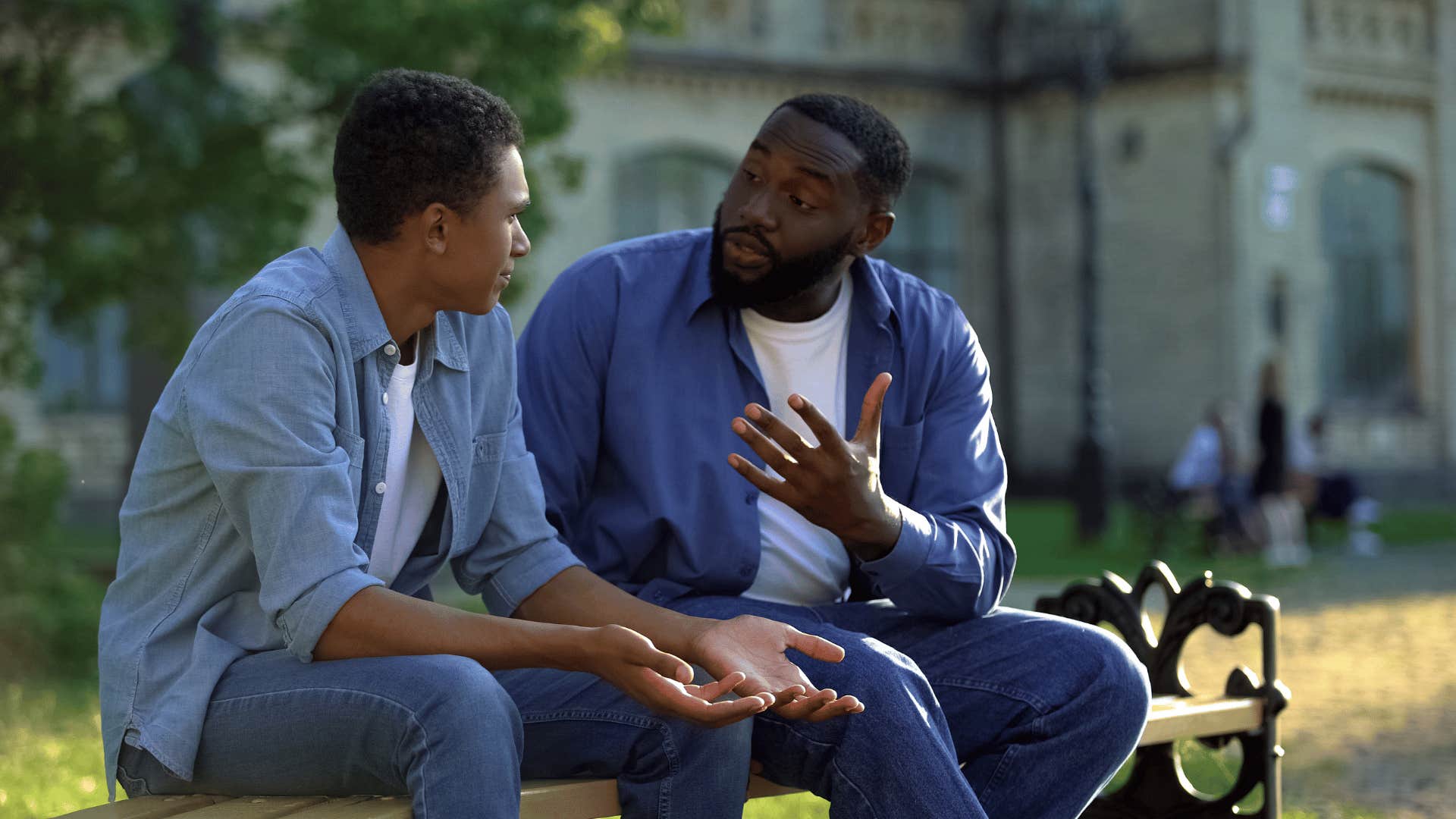10 Polite Phrases People Say Often That Are Actually Annoying
If you say any of these phrases on a regular basis, well, bless your heart.
 Shutterstock / nikkimeel
Shutterstock / nikkimeel People often hope to convey respect with their manner by saying the right things. What they may not always realize is that certain polite phrases are often actually annoying to hear.
While some social interactions call for being more formal than others, it’s typically a good idea to maintain proper etiquette in your conversations.
Sometimes, however, people may try to seem as though they’re being generous or proper in their manner of speaking, while really, they come off as self-righteous or condescending. In cases like that, their polite becomes becomes downright annoying.
Here are 10 polite phrases people say often that are actually annoying:
1. "With all due respect."
 Aloha Hawaii | Shutterstock
Aloha Hawaii | Shutterstock
A polite phrase people say often that’s actually annoying is, “With all due respect.” It’s common to hear this phrase uttered during tense conversations or heated debates, when one person disagrees with the other. The phrase might have the word “respect” in it, but its intention is anything but respectful.
People say this to make it seem like they’re being polite, but the next thing they say is usually something dismissive or outright disrespectful.
"With all due respect” is framed as a polite comment, when really, it’s used right before someone tells you you’re wrong.
2. "We can agree to disagree."
 fizkes | Shutterstock
fizkes | Shutterstock
Another polite phrase people say often that’s actually annoying is the phrase, “We can agree to disagree.”
It isn’t a bad thing to disagree, as long as people are respectful in showing their disagreement. One aspect of being part of a large and varied society is understanding that everyone experiences life differently.
Yet the phrase, “We can agree to disagree” is often used as a way to shut someone else down. Saying this stops a conversation in its tracks. While it seems polite, it can actually be annoying, since it does nothing to resolve conflict and instead, only perpetuates it.
3. "Just to play devil’s advocate."
 Antonio Guillem | Shutterstock
Antonio Guillem | Shutterstock
The phrase, “Just to play devil’s advocate” is a polite phrase people say often that's actually annoying. It’s the type of saying people use to rile other people up. While the phrase gives off the impression that the person using it is being polite, it’s actually an indication that they’re on the verge of saying something insulting.
“Just to play devil’s advocate” is usually said as a way to stir up unnecessary debate. People tend to use this phrase during emotionally intense discussions about morals or politics. They often say the phrase when they don’t want to concede that the other person’s experience is correct. Although it seems like a neutral and polite phrase, it’s actually annoying.
4. "Bless your heart."
 Ground Picture | Shutterstock
Ground Picture | Shutterstock
“Bless your heart” is a polite phrase people say often that’s actually annoying. It’s not as polite as it appears, since it’s usually meant to be condescending.
People will say “Bless your heart” when they want to seem like they were raised with good manners. But while it seems like a nice thing to say, the phrase generally implies that the person saying it thinks you’re wrong.
Whether you’ve shared an unpopular opinion or revealed an uncommonly-held belief, the saying “Bless your heart” is often meant as an insult, even though it sounds nice.
5. "Don’t worry about it."
 Perfect Wave | Shutterstock
Perfect Wave | Shutterstock
Saying “Don’t worry about it” is a polite phrase people say often that’s actually annoying. While the phrase seems like it’s a laidback form of communication, it’s really a sign that you’re dealing with a passive-aggressive person.
“Don’t worry about it” implies that someone shouldn’t feel concerned, yet it’s often said in a dismissive tone that actually conjures up a fair amount of worry.
This is a common response to a person who’s giving an apology. In some ways, it downplays that person’s efforts to apologize. Using this phrase makes it appear as though the person is accepting the apology, but they’re not actually saying, “I forgive you.” Rather, they’re sidestepping any acknowledgement of the apology that’s been offered.
6. "I’m fine with whatever."
 Prostock-studio | Shutterstock
Prostock-studio | Shutterstock
Another polite phrase people often say that’s actually annoying is “I’m fine with whatever.” People say this phrase when they’ve been asked to make a decision, like what they want to do over the weekend or where they want to go out to eat. Saying “I’m fine with whatever” gives off the illusion that someone is flexible, yet it can also indicate a lack of caring.
The phrase “I’m fine with whatever” is a passive aggressive way of talking to someone. As relationship consultant Rhoberta Shaler explains, “Passive-aggressive people appear sweet, compliant, and agreeable — but are resentful, angry, and petty.”
“Passive-aggressive people control others… by sending mixed messages, ones that leave the other person completely unclear about their actual thoughts, plans, or intentions,” she concluded.
“I’m fine with whatever” is a prime example of a mixed message, as the person saying it probably isn’t as laidback as they’re claiming to be.
7. "You seem tired."
 wavebreakmedia | Shutterstock
wavebreakmedia | Shutterstock
Commenting on someone else’s appearance is a clear sign that they weren’t raised to consider other people’s feelings. It’s generally considered rude to talk about the way other people look or present themselves, yet one phrase that seems to go under the radar of impoliteness is “You seem tired.”
“You seem tired” is a polite phrase people say often that’s actually annoying. On the surface, it seems well-meaning, as though the person saying it is concerned for your well-being, but really, it’s a way of pointing out that you don’t look your best.
Getting a good night’s sleep isn’t easy, especially for new parents or people who are struggling with health issues. Telling someone they seem tired isn’t a constructive comment, and it usually just makes the person on the receiving end feel worse than they did before.
8. "You’ll understand when you’re older."
 Motortion Films | Shutterstock
Motortion Films | Shutterstock
With age comes wisdom and a wider understanding of how the world works, yet saying, “You’ll understand when you’re older” is a polite phrase people say often that’s actually annoying. Parents use this phrase with their children often, especially when they reach adolescence and begin to question established rules.
Using this phrase might not be intentionally rude, but it’s a dismissive way to talk to people. It cuts them down and devalues their current perspective. “You’ll understand when you’re older” isn't a straightforward answer, but rather, a response that undermines the question at hand and makes people feel small.
9. "I’m sorry you feel that way."
 Chay_Tee | Shutterstock
Chay_Tee | Shutterstock
“I’m sorry you feel that way” is a polite phrase people say often that’s actually annoying. It’s an insincere way to approach delicate emotional situations, and it isn’t a true apology. In order to offer an actual apology, a person has to take responsibility for causing harm.
“I’m sorry you feel that way” is a deflection of responsibility that places fault on the person’s reaction, and not the person who hurt them. Using the phrase “I’m sorry you feel that way” functions in the opposite way of an actual heartfelt apology. Shelby Riley, a licensed marriage and family therapist, notes that “When used nefariously, an apology serves to shut down an argument.”
“When used for good, an apology is an effective communication tool for health and healing. It has the power to soothe and validate your partner’s reality, to repair the hurt that your mistake caused, and to hold you accountable so that you are far less likely to make the same mistake again,” she explained.
10. "I didn’t mean to upset you."
 Prostock-studio | Shutterstock
Prostock-studio | Shutterstock
When someone says, “I didn’t mean to upset you,” they’re shifting focus away from their own actions or behavior, onto the person who feels upset. It’s a polite phrase people say often that’s actually annoying, because it’s a way to deflect responsibility for doing something wrong. By saying “I didn’t mean to upset you,” a person avoids having to say they’re sorry.
The phrase emphasizes the person’s supposed intent, and not the actual impact of what they did that hurt the other person. This phrase shows up often in disagreement between couples. It can indicate that a relationship isn’t as stable as it could be, and often signifies that a couple has become so passive aggressive, they’re heading toward divorce.
When someone is truly sorry for hurting someone else, they focus on what they did, and not how the other person feels, which is why saying “I didn’t mean to upset you” isn’t actually polite, but annoying.
Alexandra Blogier is a writer on YourTango's news and entertainment team. She covers social issues, pop culture analysis and all things to do with the entertainment industry.
